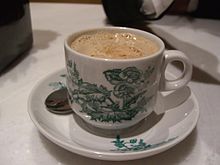Ipoh white coffee
This article needs additional citations for verification. (May 2020) |
 | |
| Place of origin | Ipoh, Malaysia |
|---|---|
| Region or state | Southeast Asia |
| Associated cuisine | Malaysia, Singapore |
| Serving temperature | Hot or cold |
| Main ingredients | Coffee powder, condensed milk |
Ipoh white coffee is a popular coffee drink which originated in Ipoh, Perak, Malaysia, resulting in Ipoh being named one of the top three coffee towns by Lonely Planet. The coffee beans are roasted with palm oil margarine, and the resulting coffee is served with condensed milk.[1]
Origins
The term ‘white coffee’ originates from the literal translation of its Chinese name, which was introduced in the 19th century by Chinese migrants who came to work in the local tin mines.[2] The coffee beans themselves are not actually white; the colour comes from the milk stirred into the end product.
In Malaysia, the original white coffee started in the Ipoh and was a drink made from beans roasted in margarine, ground, brewed, and served with sweetened condensed milk. This style of coffee continues to be popular throughout the country. However, “White Coffee” in Malaysia often simply refers to how the drink is prepared and presented - with added milk or creamer.
Overseas visitors finding the margarine-roasted coffee beans unorthodox (due to their slight caramelized flavor) are often misled into believing that there is a type of coffee bean endemic to Malaysia called the "white coffee bean". The beans used are invariably imported beans roasted to a light color.
Local coffee manufacturers now mix instant coffee powder with non-dairy creamer or whitener and sugar, and market the 3-in-1 mixture as white coffee as well. The mixture is preferred by Malaysians at home or in the office as a convenient easy-to-prepare coffee drink. The advisability, however, of consuming instant coffee mixed with non-dairy creamer and sugar daily is slowly coming into question, with some manufacturers now taking the sugar out of the mixture, and marketing the 2-in-1 mixture as sugar-free white coffee.
Styles

Traditionally, Malaysian style ‘black’ coffee roast (Kopi-O) is produced by roasting the beans with sugar, margarine and wheat.[3]
‘White’ coffee, on the other hand, is produced with only margarine and without any sugar, resulting in a less dark roast. Ipoh White Coffee is also widely available in an instant version.[1] It is sometimes consumed after dinner.[4]
The generic term ‘Ipoh white coffee’ in Chinese is "白咖啡"(Jyutping: Ji4bou2 Baak6 Kaa1fei1). Baak6 "白" (pinyin: bái), commonly meaning white, has nothing to do with the colour in this instance, but is rather a reference to the way the coffee is roasted. In Chinese, Bái also means ‘without’ or ‘unadulterated’,[5] nothing has been added to the coffee during the roasting process.[citation needed]
See also
References
- ^ a b Simon Richmond (2007). Malaysia, Singapore & Brunei. Ediz. Inglese. Lonely Planet. pp. 148–. ISBN 978-1-74059-708-1.
- ^ Avran, Dave (10 September 2019). "Intriguing and interesting inception of Ipoh White Coffee". Free Malaysia Today News.
- ^ Liew Siew Ling; Nik Ismail Nik Daud; Osman Hassan (6 September 2000). "Determination Of Coffee Content In Coffee Mixtures" (PDF). Malaysian Journal of Analytical Sciences. 7 (2): 327–332. Retrieved 29 October 2016.
- ^ Khaw, Eu Hooi (14 December 2001). "A Tried and Tested Roast Turkey". New Straits Times. p. 5. Retrieved 31 December 2009.
- ^ http://dict.baidu.com/s?wd=%B0%D7&tn=dict
